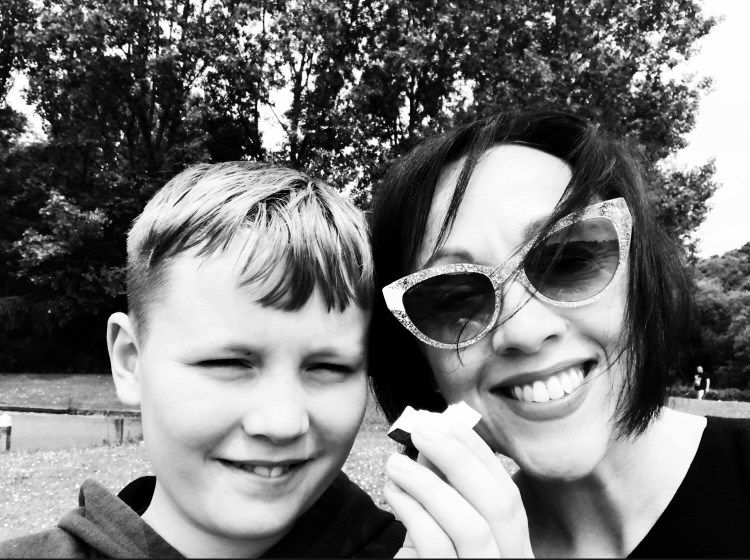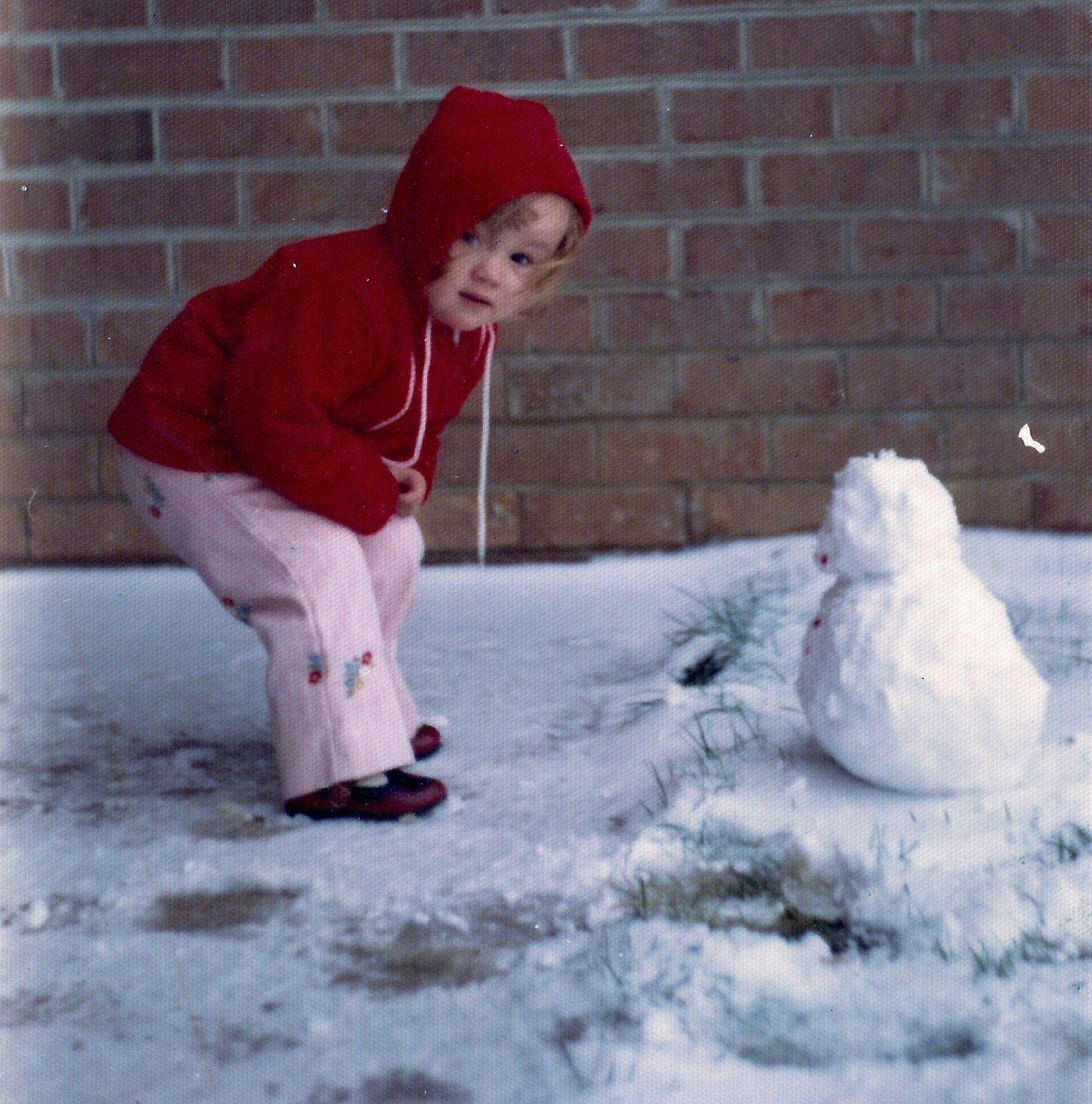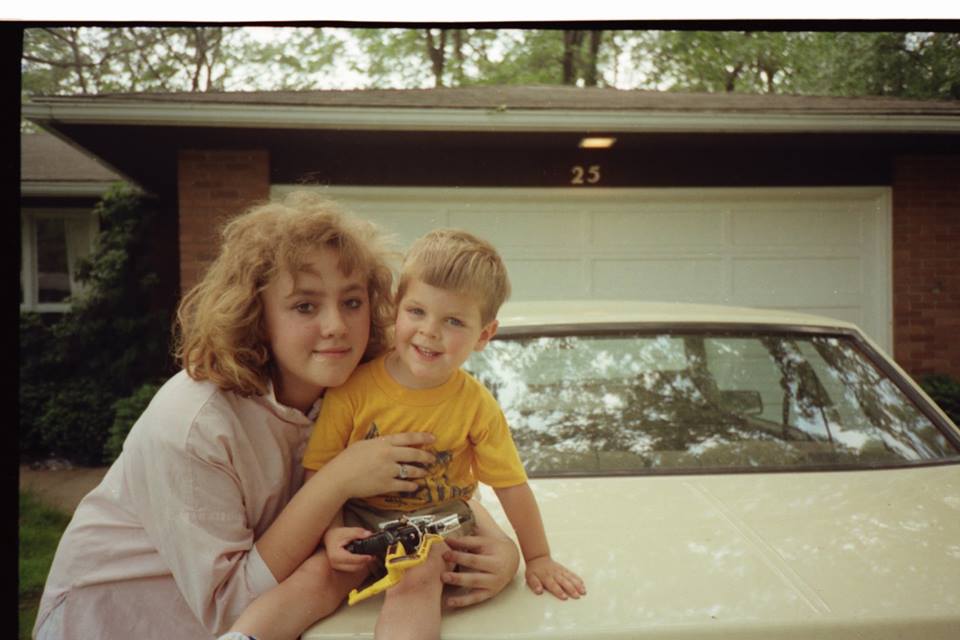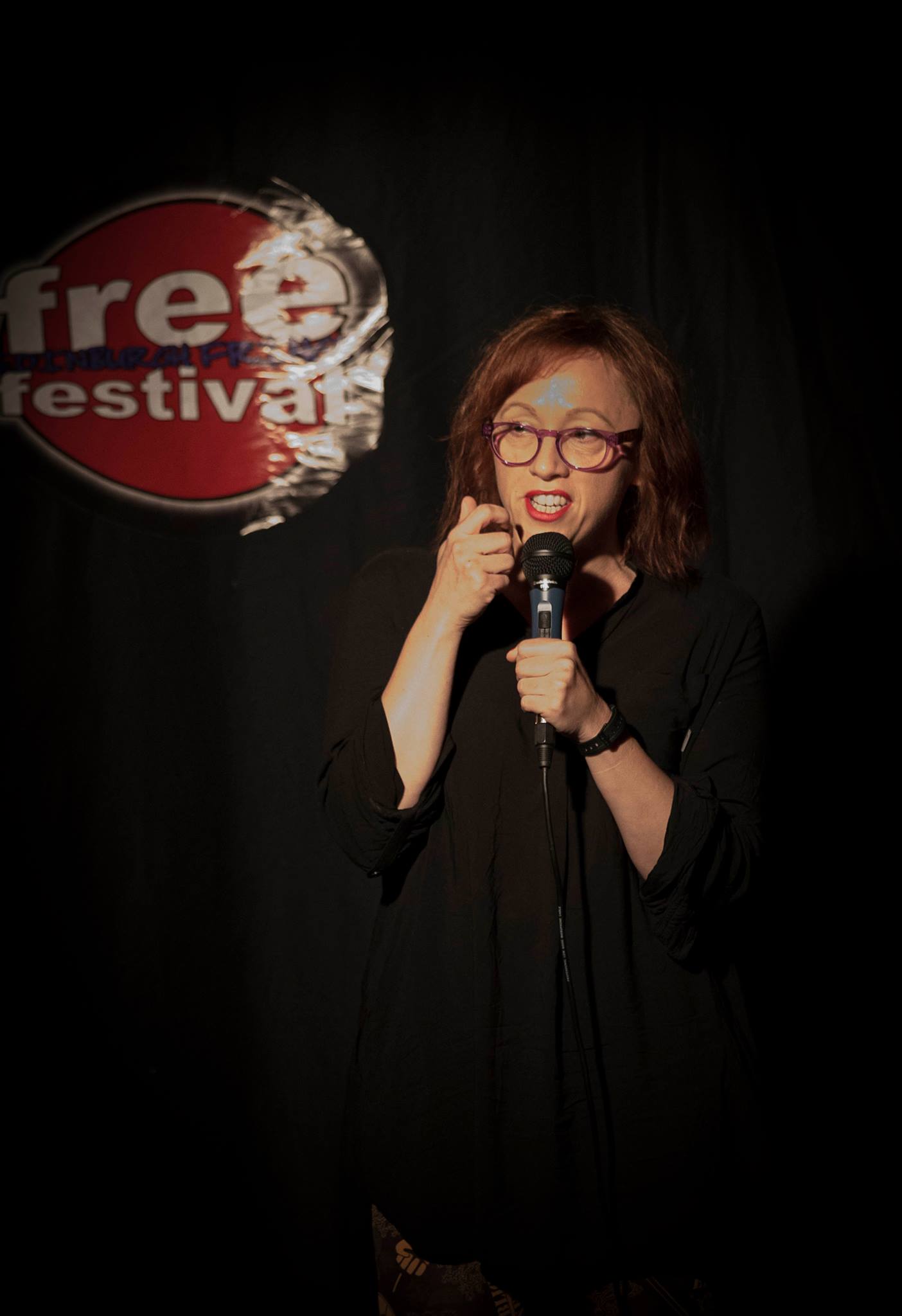
'A Certain Kind of Broken:' Amanda Graham Stays Afloat with Comedy Writing
Most comedians generally consider humor a saving grace. An ally to counter the glare of harsh reality. For comedy writer Amanda Graham, no idea rings truer. Take it from someone who escaped a cult. Who found a way to survive as a single parent. Who never let go of what could be in the face of what was. And who was rewarded by glimmers of triumph. Eternal imposter syndrome be damned.
Amanda Graham has never done anything the normal way.
From the time she was trapped in an American Baptist cult, to the days she spent hiding from a predatory pastor accused of rape, the 48-year-old’s childhood memories sound like something out of The Handmaid’s Tale.
“It was absolute 100% control over everything you did and everything you said,” said Graham, who now lives in Bolton, England with her son.
“You weren’t allowed to hang out with outsiders. There was danger when you tried to leave and an absolute unquestioning of the pastor’s power.”
Control. Danger. Power. Over the last several years, Graham has explored these themes in her scripts by delving into the memories of her nomadic and often arduous upbringing.
Look no further than the titles of her work:
How Heather Survived the Apocalypse tells the story of a teenage girl preparing for the impending rapture.
How to Be Evil follows another girl who seeks out her estranged mother—who happens to be the worst person in the world—so she can learn her wicked ways in an effort to get ahead in life.
“They all have a religious theme with absurd people and characters functioning in systems that are all about unchecked power,” she says.
Her experiences haven’t only yielded drama, as she’s had much success in the last year with comedy, writing the half-hour fairytale animation special "Little Moth and the Waning Moon" for the London-based animation boutique Dragonbee. She’s also developing projects for BBC Children.
But the road to this point was as unfunny and exasperating as the days Graham spent with a mother she describes as “brainwashed” (as was everyone in her church). She recalls those years secretly trying to listen to her favorite band, The Monkees, and sneaking glimpses of her favorite comedians and shows.
The fear of punishment always a threat.
It was that grit, terror, and unwillingness to accept her surroundings as ordinary that influenced her writing and helped her as a comedy writer.
“I think you need to be a certain type of broken to reach people in the audience who need it the most,” Graham says. “There’s a specific flavor of darkness that only comes from an inner scream ..."

Born in England to an American mother and a British father, Graham was the oldest of three siblings.
By the age of 10, she’d lived in three different countries—thanks to her father’s career as a doctor—before eventually settling for a short time in Baltimore, Maryland.
A mixed cultural upbringing provided Graham with an appreciation of British and American television shows equally. Her parents loved classic comedians on both sides of the pond: Eddie Murphy, Bob Newhart, Monty Python. The Adventures of Priscilla, Queen of the Desert, a 1994 Australian film, was a favorite of Amanda’s. That dual familiarity has allowed her to write for two audiences and straddle between worlds as a comedic writer.
“I always felt really comfortable with both sensibilities,” Graham said. “My mom’s sensibilities were super American, and my dad’s were super British—the only thing they ever agreed upon with comedy was Mel Brooks.”

As a child, Graham’s excitement and love for comedy grew with every show and comedian she watched. Her desire to write comedy was growing, too. But around 1980, her budding dream seemingly died overnight when her parents split and her mother joined a Baptist church near Baltimore.
That meant no more movies. No more comedians.
Rock music wasn’t an option. Neither was watching TV. Those things were all considered too “worldly.”
Consequently, Graham and her siblings had to hide everything as they came to grips with a new existence devoid of creativity, happiness, or humor.
“Girls had classes to learn how to breastfeed when we were like 12 or 13, and the boys were outside playing sports. We could hear them having fun and we were inside learning how to bake.”
It was, she said, a dark time full of lies, unquestionable power, and conspiracy theories.

Rochester is a quaint city, situated on Lake Ontario in New York State.
It’s known as the birthplace of photography giant Kodak and famous for bitterly cold winters accompanied by lake effect snow.
The Graham family moved to Rochester in the spring of 1983. Which meant the Baptist church that had brought Amanda so much grief in Baltimore was a thing of the past. But soon after arriving in their new city, they attended a Fourth of July parade where they saw a float for a local Baptist church. The pastor was playing the trumpet and preaching on the flatbed of a moving truck.
“They looked just crazy enough for us,” Graham laughed. “My mom was like ‘Where do we sign up?’ And that’s when the real crazy shit started.”
Graham spent nearly every day at the church. As the weeks went by, her discomfort grew. Sermons were 90 minutes of hellfire and brimstone. The pastor routinely condemned the church’s women and girls as worthless, dismissed them as “scum” who were “put on the Earth to deceive men.” Women were also prevented from speaking in church.
And one particular piece of the sermon still haunts her: during the apocalypse, the pastor said, Jesus would come back to Earth accompanied by trumpets. Some people would fly up to the clouds to meet him. If you hadn’t confessed your sins, the antichrist would come and build dangerous armies, beheading everyone left behind.
“Even now, when I hear a trumpet, my body tenses up because I think it is happening,” Graham said. “If I arrived home and no one was in the house, the first thing I thought was that I was left behind.”

The pastor also did sermons on rape, Graham said, specifically saying there was no such thing, and that women were somehow responsible when it happened. Because of this, women and girls in the church weren’t allowed to wear pants because it could “lead men astray.” They were forced to wear skirts in a city where the Lake Ontario winds would routinely drop the temperature into single digits.
Perhaps unsurprisingly, the church was eventually forced to confront its own revelations. Two years after the Grahams joined, the pastor was accused of sexually abusing at least six female members during counseling sessions. Many in the church dismissed the allegations as false—until the pastor allegedly incriminated himself by writing a threatening letter to one of the victims.
Graham recalled the day she was at a fellow church member’s home to play when the pastor, armed with a loaded gun, repeatedly slammed himself against the door to the house. Graham and the other children locked themselves inside a room upstairs for hours before being relocated to a farmhouse, where they hid for several days.
“It was scary,” Graham exclaimed. “When your pastor is outside with a gun and everyone’s yelling downstairs and you don’t know what’s happening. They didn’t have a phone to reach the police so they had to hope the neighbors heard their loud whispers from the other side of the wall.”
The pastor was banished from the church, but according to Graham, he was never prosecuted. He started a new church in upstate New York after the incident. To prevent negative media, no one reported him.
Any members hoping for a fundamental change in the church were disappointed. Graham says the female victims were forced to “confess their sexual sins” in front of the congregation. And the church eventually got a new pastor, who she says led the church down a similar path as his predecessor, theologically speaking.
“My time in Rochester is tattooed in my mind, it was such a formative thing,” Graham explains. “I had never experienced that type of physical danger and uncertainty before.”
During those dark, hopeless moments in her life, comedy provided Graham an outlet. Although she was blocked from accessing it by her mother, she became a rebellious and cunning teenager, finding ways to often sneak a glimpse of her favorite comedian or show.
“Comedy for me was like coming up for air when someone’s been holding your head underwater,” Graham said. “If you don’t find the meaning during really scary experiences, you either shut down or break down. I needed to find meaning in it. I had to find value in it. And that’s why I connected it to comedy and why I needed that escape.”
Graham was clever when it came to secretly accessing her favorite pop culture. She would hide photos of Duran Duran behind posters of horses on her bedroom walls. Large Bible verses placed around her room hid pictures of The Monkees. She would take Christian cassette tapes and record over them, but leave them in the original casing.
Her biggest gambit? Sneaking out with a friend one night to attend a Monkees concert.
“I have a joke in one of my scripts that I don’t know how Baptist kids aren’t recruited to work for the CIA,” Graham laughed, adding, “It’s probably the complex post-traumatic stress disorder that disqualifies us.”

“At least I’m not in a fucking cult anymore.”
It’s ironic.
The first semblance of freedom Graham experienced as a teenager was at Liberty University, a religious institution so restrictive that women could be fined for wearing skirts too short. But given Graham’s confined upbringing, it was an unlikely step up.
Past experiences served to shape her into a political and social activist on campus. She majored in politics and openly spoke out against injustice. She was open about her pro-choice stance. Once, she contacted local news stations when a student athlete was kicked out of Liberty for rape—only to be permitted to re-enroll. Graham’s public advocacy led to threatening phone calls and having the lug nuts removed from her car.

After three years, she left Liberty and never looked back.
“I was tired of fighting. I was tired of being threatened. I was tired of arguing about things that I thought were just reasonable positions and a person’s right.”
Enthralled by her newfound freedom—no religion, no authority, no rules—Graham says she became a “rave head” for years after leaving Liberty. In 1993, she started raving in Europe with her future husband. She moved to England to be with him, traveled, and eventually settled down around 2001. At that time, Graham decided to go back to school, and though it wasn’t for writing comedy, it’s when she began to take the reins of her own life and fulfill her comedic purpose.
She took meetings, but finding her place in the UK’s comedy world came after repeated failure and rejection. It also came after Graham’s path was re-routed by executives who didn’t believe she could be a comedy writer because of her lack of experience.
“When it was hard,” Graham said, “I would just say to myself, ‘At least I’m not in a fucking cult anymore.'”
It became a sort of motto, something for Graham to tell herself as she embarked on one of the most vulnerable stages of her life. After all, becoming a comedy writer is already exceedingly difficult. Doing so when you’re in your 40’s, a divorcee, a mother to a son with autism, and a person with no comedic experience?
Well ... see the aforementioned motto.
In 2004, Graham received her masters in gender, literature and spirituality at the University of Liverpool and then worked on her PhD in theology at Oxford. She eventually dropped out to pursue comedy writing and television—her true passion. She began her TV career as an intern on "Songs of Praise," a religious BBC program presenting Christian hymns sung in churches around the UK. After completing her internship, Graham interviewed with Hat Trick, a British, independent TV production company.

She went in for an interview in the comedy department.
She walked out with a job in documentary production.
Because of Graham’s university background, they couldn’t see her writing comedy. She began working on religious documentaries, but the whole time all she could think about was writing comedy for TV. Eventually, she began doing something she’d never considered before: stand-up.
Graham says the three years she did stand-up provided her with a sense of freedom and a release from the confines of her reality. She admits there were times when she was horrific. At one point she started taking beta blockers to help with stage fright. But she persisted.
“I didn’t do stand-up because I wanted to do stand-up,” Graham said. “I did stand-up because I wanted to write comedy. And nothing will make you a better comedy writer.”
And she got better. It helped hone her skills.
But it wasn’t what she wanted to do, and the moment Graham got her first break, she quit stand-up and never looked back.

Everyone dreams of having a seat at the proverbial table.
If getting a foot in the door is the first step toward being in this industry, then getting that seat—a saved spot that’s for you and no one else—can feel like the first time you’re truly part of the industry. You’re a creative, and on some level, a decision maker.
You’re a writer.
“It’s very difficult to be successful if you don’t see yourself at the table,” Graham said.
Indeed, she never quite saw herself having a spot there. She didn’t have the comedic background people wanted. She certainly didn’t have the experience they kept speaking of.
But one day, she found herself sitting at a literal table with more than a dozen established writers.
As with so many things in life, getting there was a seemingly random combination of luck and preparedness. A co-worker attended one of Graham’s stand-up gigs and was so impressed she recommended her to Vanessa Amberleigh, an executive producer at BBC Children. Amberleigh liked what she saw, and simply asked Graham to send her five jokes.
It was perfect timing. A year prior, Graham says she made a small but decisive change in her stand-up routine. She switched from telling long narratives as a storyteller comedian to focusing on one-liner material. The reason, she says, was simple.
“I have a resting bitch face!” Graham said, laughing. Then she adds, “And I know my voice doesn’t have a lot of variation.”

Those one-liners must have worked wonders. Graham was extended an invitation to a writer’s residential for a week, helping to develop ideas for "Sesame Street’s The Furchester Hotel" and other new BBC shows. She even developed ideas for Cookie Monster. All while sitting at a table with established writers and an executive producer of a major network. A table with a spot for her.
There was just one problem, and for anyone familiar with the plight of artists, it won’t come as a surprise:
“I had major imposter syndrome,” Graham said. “I was sitting at this huge table. There must have been like 15 people there who were regular script writers and I was the only one who had never written anything.”
It didn’t matter. She pitched herself as a multidimensional talent who had spent six years in documentary TV, three more as a stand-up comic, and someone who wanted to work in kids TV as a way to break into the comedy world. Then, at the end of the week, each person was given the ability to pitch show ideas.
Graham walked away with her first script commissioned.
“Then it was trial by fire,” she said. “I began writing scripts when I had no idea what I was doing.”
When she wasn’t faking it, Graham was on the BBC writers room website, where she had access to every show’s script. She studied the software and the writing, detail by painstaking detail, until she grasped the process. In her first year as a screenwriter, Graham was hired to work on a total of 12 scripts for four different kid’s shows.
“It was like boom, boom, boom,” Graham said.
“And then I made the stupid decision to quit my regular job.”

It was 2017, and Graham’s son was turning 9 in a few days.
She hadn’t bought him a gift or a cake. She was in debt, struggling to keep a roof over their heads and food on the table. After a successful first year as a professional screenwriter, suddenly, the projects and opportunities came to a halt. It was a humbling reversal of fortune.
“It was a really hard time because I knew this was what I was supposed to be doing and because it had taken me so long to get there,” Graham said.
“I was really confused why I went from all that early success to nothing.”
Graham and her son were able to live off her savings for a short while. Then it was gone. When it came time to celebrate her son’s birthday, all she wanted in the world was to do it properly.
She was able to buy him a present using the last of an Amazon gift card. What to do about the double chocolate cake from the grocery store down the road, the one her son had specifically requested? She could have borrowed money from a friend, but she’d have to pay that back, too. She decided, in her desperation, to do something she’d never done before: break the law.
“I was very scared, because I thought, ‘If I get busted over a birthday cake, you can see the newspaper headlines,’ can’t you?” she said.
“But I had to do it. My son needed a birthday cake.”
She planned it all out. First, she bought potatoes and carrots.
“They’re bulky and cheap,” she recalls.
Then, she used them to cover the cake. Next, she put on headphones to use as an excuse if she got caught. She figured she could say she didn’t hear the beep when leaving the self-checkout aisle. Knees trembling, body shaking, she slipped out of the store with the cake, fearful to look back and see if she was being followed.
No one stopped her. She’d gotten away with it.
Nevertheless, it was a dehumanizing experience that still haunts her today. Her perilous financial situation took a toll on her physically, too. She lost much of her hair, going through a period of time with bald patches she says only a scarf could improve.
After more than a year of struggling, which saw Graham muster the courage to ask her father if she could borrow money, she landed a job working on a development team as an associate producer. About six months after that, she found out she was a winner in Edinburgh’s Ones to Watch writing competition, a turning point for Graham and her career.
“I was with a friend when I found out,” she said. “I turned to her and said, ‘Oh my god, I think I’m going to be okay. I think my son and I are going to be okay.'”

Today, Graham beams with pride when she speaks about her 11-year-old. They have an unbreakable bond, but at one time, Graham feared she and her son would never relate. When he was five, Graham’s son was diagnosed with autism. For any parent, an alarming diagnosis. It was even more so for Graham, because of something the doctor said: her son’s understanding of language would be explicitly literal.
In short, he’d never be able to tell—or understand—a joke.
It was a knife to Graham’s heart. Her language was comedy. Her occupation was writing jokes. She’d imagined bonding with her son over humor and laughter and ridiculous one-liners. Now, that would never happen.
Or so she thought. About six months after her son’s diagnosis, a miracle:
“I was sitting at my dining room table and he was at the bottom of the stairs and it was winter so it’s freezing here,” Graham said.
“He was done up in his little onesie, and he had these huge slippers on. He got to the bottom of the stairs and we have a laminate floor, so he slipped a bit and he looked at me and said, ‘They don’t call ‘em slippers for nothing!’”
A regular comedy prodigy. And much to Graham’s joy, a tacit rejection of everything their doctor had said.
“I hated that they tried to box him in. I lived in a boxed-in world, and I did not want that for him.”
Graham has found ways to keep herself afloat.
At any given time, she’s working on multiple projects for various production companies.
Besides her gigs in children’s television, Graham is co-writing a musical with actor/writer and Second City alum Jennifer Banks and BBC producer Katharine Longworth. She’s developing a new 30-minute sitcom with actor Jeff Cole, working on her first feature-length script, a road trip comedy with a mother and son who both have autism.
Even with the work, not everything is perfect at home.
It rains inside Graham’s apartment building. The toilet downstairs hasn’t worked in over a year; the oven’s been broken for three. It’s all a function of the unpredictability of her finances, a direct byproduct of being a writer.
But Graham’s life is uniquely hers, and it’s a far cry from where she began. Comedy has been Graham’s blessing and continues to be—her savior, during a life full of disappointment and darkness. As she presses on, she hopes her story and comedic work inspires others who may need saving, too.
“Sometimes,” Graham says, “I think comedy is the only thing that rescues us.”
Follow Amanda on: Twitter